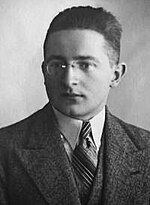Marian Rejewski | |
|---|---|
 Rejewski, c. 1932 | |
| Born | Marian Adam Rejewski 16 August 1905 |
| Died | 13 February 1980 (aged 74) |
| Nationality | Polish |
| Occupation(s) | Mathematician and cryptologist |
| Known for | Solving the Enigma-machine cipher |
| Awards | |
| Signature | |
| The Enigma cipher machine |
|---|
| Enigma machine |
| Breaking Enigma |
| Related |
Marian Adam Rejewski (Polish: [ˈmarjan rɛˈjɛfskʲi] ; 16 August 1905 – 13 February 1980) was a Polish mathematician and cryptologist who in late 1932 reconstructed the sight-unseen German military Enigma cipher machine, aided by limited documents obtained by French military intelligence.
Over the next nearly seven years, Rejewski and fellow mathematician-cryptologists Jerzy Różycki and Henryk Zygalski, working at the Polish General Staff's Cipher Bureau, developed techniques and equipment for decrypting the Enigma ciphers, even as the Germans introduced modifications to their Enigma machines and encryption procedures. Rejewski's contributions included the cryptologic card catalog and the cryptologic bomb.
Five weeks before the outbreak of World War II in Europe, the Poles shared their achievements with French and British counterparts who had made no progress, enabling Britain to begin reading German Enigma ciphers. The intelligence gained by the British from Enigma decrypts formed part of what they code-named Ultra and contributed—perhaps decisively—to the defeat of Nazi Germany.[Note 1]
Soon after the outbreak of war, the Polish cryptologists were evacuated to France, where they continued breaking Enigma ciphers. After the fall of France in June 1940, they and their support staff were evacuated to Algeria in North Africa; a few months later, they resumed work clandestinely in southern Vichy France.
After the Vichy "Free Zone" was occupied by Nazi Germany in November 1942, Rejewski and Zygalski escaped via Spain (and Spanish imprisonment), Portugal, and Gibraltar to Britain. There they enlisted in the Polish Armed Forces and were put to work solving low-grade German ciphers.
After the war, Rejewski returned to Poland and his family. For two decades he remained silent about his prewar and wartime work so as to avoid the attention of Poland's Soviet-dominated government. In 1967 he broke his silence, providing Poland's Military Historical Institute his memoirs of work at the Cipher Bureau.
- ^ "Postanowienie Prezydenta Rzeczypospolitej Polskiej z dnia 14 lutego 2000 r. o nadaniu orderów" [Polish Order of the President of the Republic on 14 February 2000. On awarding orders.], Monitor Polski (in Polish), 13 (273), 14 February 2000, archived from the original on 4 April 2015, retrieved 27 February 2015
- ^ Untold Story of Enigma Code-Breaker, 5 July 2005, archived from the original on 18 November 2005, retrieved 9 January 2006
- ^ "Najwyższe odznaczenie amerykańskiego wywiadu za złamanie kodów Enigmy" [Highest American Intelligence Award for Breaking Enigma Ciphers], Gwiazda Polarna (in Polish), 103 (20): 6, 22 September 2012
- ^ Polska Agencja Prasowa (5 August 2014), "Wyróżnienie Milestone dla polskich matematyków za złamanie Enigmy" [Milestone Award for Polish mathematicians for breaking the Enigma], Newsweek (in Polish), archived from the original on 25 August 2016, retrieved 23 July 2016
- ^ Mazierska, Janina (December 2014), "IEEE Milestone Dedication on the First Breaking of Enigma Code (Poland Section)" (PDF), The IEEE Region 10 Newsletter: 2–4, archived (PDF) from the original on 27 February 2015, retrieved 1 February 2015
- ^ Brzezinski 2005, p. 18
Cite error: There are <ref group=Note> tags on this page, but the references will not show without a {{reflist|group=Note}} template (see the help page).